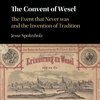Of Church Orders and Postmodernism
The Convent of Wesel, the Construction of the Dutch Reformed Church Order and the History and Nature of History
DOI:
https://doi.org/10.18352/bmgn-lchr.10897Abstract
Self-avowedly influenced by the postmodernist critique of nineteenth-century ‘positivism’, Jesse Spohnholz's ambitious and multiple prize-winning 2017 The Convent of Wesel: The Event that Never was and the Invention of Tradition speaks at once to the political and institutional history of the Reformed churches of the Netherlands and northwestern Germany, to the role of archiving practices in shaping historical understanding, and to the nature of historical study. This review offers both an extended synopsis and a critique of the book. While recognizing its considerable achievement, it questions its framing of its findings about the Reformation era with reference to the ‘confessionalization’ debate, its reliance on a prefabricated narrative about archives as instruments of power and marginalization, and its mischaracterizations of post-Rankean historical practice and theory. Implications of the book’s findings for further research into the politics and personalities of the Reformation in the Low Countries are also suggested.
Downloads

Published
Issue
Section
License
Copyright (c) 2021 Philip Benedict

This work is licensed under a Creative Commons Attribution-NonCommercial 4.0 International License.
Authors who publish with this journal agree to the following terms:
a) Authors retain copyright and grant the journal right of first publication with the work simultaneously licensed under a Creative Commons Attribution 4.0 International (CC BY 4.0) that allows others to share the work with an acknowledgement of the work's authorship and initial publication in this journal.
b) Authors are able to enter into separate, additional contractual arrangements for the non-exclusive distribution of the journal's published version of the work (e.g., post it to an institutional repository or publish it in a book), with an acknowledgement of its initial publication in this journal.
c) Authors are permitted to post their work online (e.g., in institutional repositories or on their website) prior to and during the submission process.
Authors are explicitly encouraged to deposit their published article in their institutional repository.








